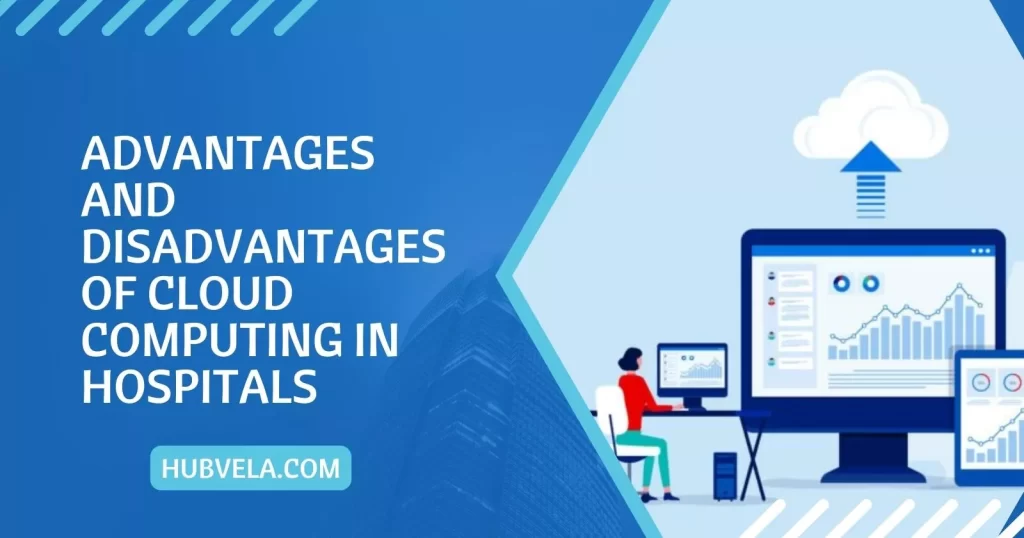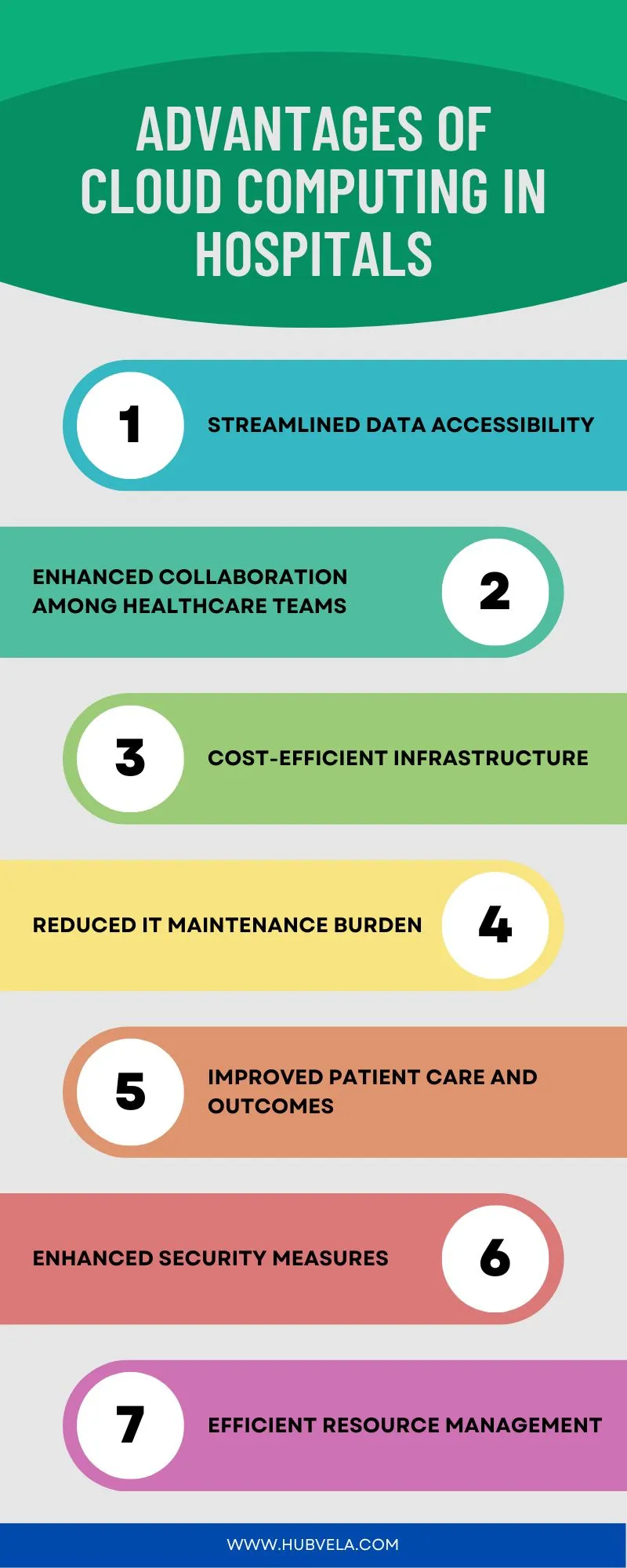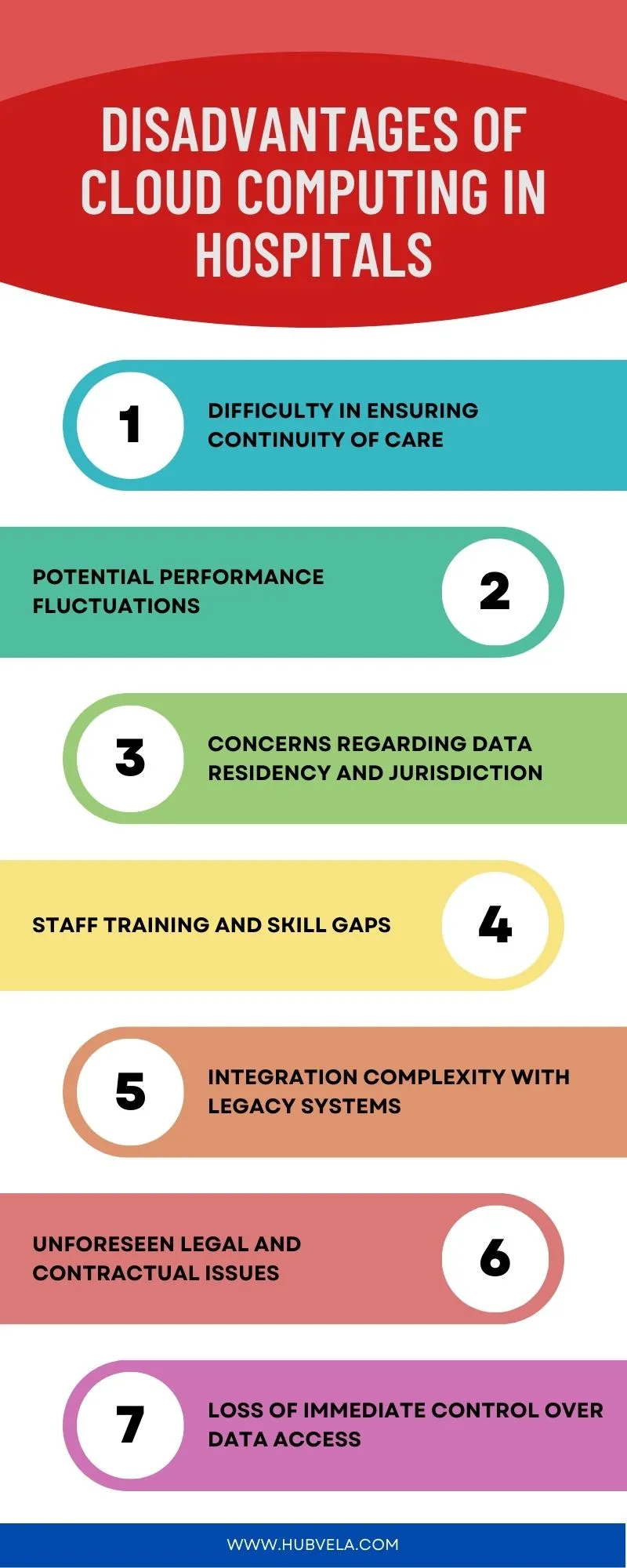Cloud computing has become an increasingly popular technology in the healthcare industry, offering numerous benefits to both patients and providers.
Cloud computing solutions can reduce the cost of IT infrastructure, improve collaboration and communication, and increase accessibility and flexibility.
However, there are also some disadvantages to using cloud technology in healthcare, such as concerns about data security and HIPAA compliance, and the fact that cloud services are managed and monitored by the service provider, which can limit the organization’s control over their data.
In this article, we will explore the advantages and disadvantages of cloud computing in hospitals.

--Advertisement--
Advantages of Cloud Computing in Hospitals
Cloud computing is transforming the healthcare industry by providing a cost-effective, scalable, and secure way to store, manage, and process healthcare-related data.
Hospitals and healthcare providers are increasingly adopting cloud technology to streamline electronic record keeping, enable a patient-centric approach, and support digital transformation. We will delve into the advantages of cloud computing in hospitals.

1. Streamlined Data Accessibility
One of the advantages of cloud computing in hospitals is streamlined data accessibility.
Cloud technology enables healthcare providers to store, manage, and process healthcare-related data remotely via the internet, making it easier for doctors to collaboratively view and share a patient’s medical records, see updates to these records in real-time, and provide treatment based on comprehensive information about past experiences the patient had with other care providers.
Cloud-based artificial intelligence (AI) and machine learning (ML) software like patient experience management software and healthcare data analytics help patients compile and analyze data, enabling physicians to respond to public health threats and limit the spread of infectious diseases.
Cloud technology like Telehealth solution makes it possible by giving patients access to health records that on-premise solutions cannot support.
2. Enhanced Collaboration Among Healthcare Teams
Cloud technology enables physicians, nurses, and other healthcare professionals to access patient records and other critical information from anywhere, at any time, and on any device.
This means that healthcare teams can work together more efficiently, even if they are not in the same location.
For example, a physician can consult with a specialist in another part of the country or the world, and both can access the same patient records in real time.
This can lead to better patient outcomes, as healthcare teams can make more informed decisions and provide more coordinated care.
3. Cost-Efficient Infrastructure
Cloud computing enables healthcare providers to reduce their data storage costs by eliminating the need to deploy and maintain large on-premise systems.
Cloud storage solutions for healthcare use economies of scale to drive down data management costs for their customers, which are hospitals and healthcare facilities.
Beyond the immediate economic advantages associated with choosing cloud storage over an in-house data storage solution, organizations benefit in the long term from easier upgrades and reduced scaling costs.
Cloud computing can help healthcare providers be cost-effective, scalable, and better at communication to provide affordable, patient-centric service.
4. Reduced IT Maintenance Burden
Cloud computing eliminates the need for hospitals to maintain their own IT infrastructure, which can be costly and time-consuming.
Instead, hospitals can rely on cloud service providers to handle the maintenance and upgrades of their IT systems. This allows hospital staff to focus on patient care and other important tasks, rather than spending time and resources on IT maintenance.
Additionally, cloud service providers often have more expertise and resources to ensure that IT systems are secure and up-to-date, which can help hospitals to better protect patient data and comply with regulations.
5. Improved Patient Care and Outcomes
Cloud computing has several benefits for hospitals, including improved patient care and outcomes. Cloud technology enables physicians to access patient records from anywhere, which can help them make more informed decisions about patient care.
Patients can also access their health records through cloud-based telehealth solutions, which can help them become more involved in their care journey.
Additionally, cloud-based artificial intelligence and machine learning software can help physicians compile and analyze complex patient data, enabling them to respond to public health threats and limit the spread of infectious diseases.
Cloud computing can also improve data security, ensuring the reliable disaster recovery of patient information.
6. Enhanced Security Measures
Enhanced security measures in cloud computing for hospitals play a crucial role in safeguarding patient data and ensuring compliance with healthcare regulations.
Cloud computing offers tightened security through features such as encryption, access controls, and regular security updates, which help protect sensitive patient information from unauthorized access and cyber threats.
By leveraging cloud-based solutions, hospitals can benefit from improved data security, reliable disaster recovery, and reduced risk of security incidents.
Additionally, cloud providers often adhere to industry-specific security standards, offering healthcare organizations a secure and compliant environment for storing and managing patient data.
These enhanced security measures not only protect patient information but also contribute to building trust and confidence among patients and healthcare providers in the use of cloud technology for delivering quality and secure patient care.
7. Efficient Resource Management
Efficient resource management is a key advantage of cloud computing in hospitals. By analyzing inefficiencies and uncovering underutilized resources, cloud-based systems help hospitals make the most of what they already have.
Cloud-based solutions are cost-efficient and help to create effective solutions with minimal use of resources, without having to prioritize competing infrastructure priorities with the IT department.
Cloud computing resource management plays a significant role in data centers and is directly dependent on the application workload.
Various services such as Infrastructure as a Service (IaaS), Platform as a Service (PaaS), and Software as a Service (SaaS) are offered by cloud computing to provide compute, network, and storage capabilities to the cloud users utilizing the pay-per-usage approach.
Cloud computing provides hospitals with efficient resource management solutions that can help them optimize care delivery, save money, and make the most of their existing resources.
Disadvantages of Cloud Computing in Hospitals
Cloud computing has become increasingly prevalent in the healthcare industry, offering numerous benefits such as improved collaboration, cost savings, and better data security.
However, alongside these advantages, there are also several disadvantages that need to be considered. We will delve into the disadvantages of cloud computing in hospitals.

1. Difficulty in Ensuring Continuity of Care
One of the challenges associated with cloud computing in healthcare is the difficulty in ensuring continuity of care.
While cloud computing offers easy access to data and the ability to provide continuous care outside the office, it also introduces potential downtime and service interruptions, as well as privacy and security concerns.
Healthcare organizations need to consider the impact of technological problems, such as power outages or loss of internet service, which could hinder their ability to connect with the cloud and provide uninterrupted care to patients.
Additionally, ensuring the security of sensitive patient information and compliance with regulations like HIPAA remains a significant concern when transitioning to cloud-based systems.
Therefore, while cloud computing brings numerous benefits to the healthcare industry, it is essential for organizations to carefully address these challenges to maintain the continuity and quality of patient care.
2. Potential Performance Fluctuations
Potential Performance Fluctuations in cloud computing can be a concern for healthcare organizations. While cloud computing offers benefits such as improved collaboration, cost savings, and better data security, it also comes with potential drawbacks.
One of the cons of cloud computing in healthcare is the potential downtime and service interruptions, which can lead to performance fluctuations and affect the accessibility of critical systems and patient data.
Healthcare providers need to carefully consider these drawbacks and ensure that they have contingency plans in place to mitigate the impact of potential performance fluctuations when adopting cloud computing solutions.
3. Concerns Regarding Data Residency and Jurisdiction
Data residency and jurisdiction are significant concerns in the context of cloud computing, particularly for hospitals.
Data residency refers to where data is physically stored, and it is essential for adhering to data protection regulations, bolstering security, and ensuring compliance with data privacy and security standards.
Cloud providers store data globally across different data center locations, which can create data residency concerns, as cloud computing customers may be unaware of their data’s physical location.
Understanding data residency policies and ensuring that service-level agreements with cloud providers establish where data can and cannot be stored are crucial steps for hospitals to address these concerns.
Data sovereignty, on the other hand, refers to the laws applicable to data because of the country in which it is physically located, and it is distinct from data residency.
Hospitals need to consider these factors when storing and processing sensitive patient data to ensure compliance with local laws and regulations, data privacy, security, and building trust with patients and stakeholders.
4. Staff Training and Skill Gaps
One of the disadvantages of cloud computing in hospitals is the potential for staff training and skill gaps. As hospitals transition to cloud-based systems, staff members may need to learn new software and processes, which can be time-consuming and costly.
Additionally, some staff members may not have the necessary technical skills to use cloud-based systems effectively, which can lead to errors and inefficiencies.
To address this issue, hospitals may need to invest in training programs and provide ongoing support to ensure that staff members are comfortable and proficient with cloud-based systems.
5. Integration Complexity with Legacy Systems
One of the disadvantages of cloud computing in hospitals is the integration complexity with legacy systems.
Hospitals often have existing systems that are not compatible with cloud-based solutions, which can make it difficult to integrate new cloud-based systems with legacy systems.
This can lead to issues with data transfer and compatibility, which can ultimately impact patient care. Hospitals need to evaluate their existing systems and determine how they can integrate with cloud-based solutions before making the switch.
Some hospitals have chosen to establish private clouds based on virtualization technology, which supports easy and overall access to each of the hospital’s information systems from all devices throughout the hospital.
6. Unforeseen Legal and Contractual Issues
When healthcare organizations transition to cloud computing, they may face challenges related to data security, privacy, and compliance with regulations such as the Health Insurance Portability and Accountability Act (HIPAA).
Cloud service providers may have different legal and contractual frameworks, which can lead to unforeseen issues in terms of data ownership, access, and liability in case of data breaches or service interruptions.
Additionally, the use of cloud computing may impact existing contracts with IT vendors and require renegotiation to align with the new cloud-based infrastructure.
Therefore, while cloud computing offers benefits such as cost savings, improved accessibility, and better data security, healthcare organizations need to carefully consider and address the potential legal and contractual implications to mitigate unforeseen issues.
7. Loss of Immediate Control Over Data Access
One of the disadvantages of cloud computing in hospitals is the loss of immediate control over data access. Cloud computing is completely managed and monitored by the service provider, which means that the hospital may have less control over its data.
This can be a concern for hospitals that need to maintain strict control over patient data due to privacy and security concerns.
Additionally, if there is a problem with the cloud service, such as a power outage or loss of internet service, the hospital may not be able to access its data until the issue is resolved.
Therefore, hospitals need to carefully consider the level and type of security and data encryption used by the hosting service before adopting cloud-based applications.
Conclusion on Advantages and Disadvantages of Cloud Computing in Hospitals
In conclusion, cloud computing has both advantages and disadvantages in the healthcare industry. Some of the advantages include cost savings, improved collaboration and communication, increased accessibility and flexibility, better data security and disaster recovery, and scalability and efficiency.
On the other hand, some of the disadvantages include less control over the cloud infrastructure, concerns about data security and HIPAA compliance, and the possibility of technological problems such as power outages or loss of internet service.
Ultimately, healthcare organizations must weigh the pros and cons of cloud computing and determine whether it is the right solution for their specific needs and circumstances.


